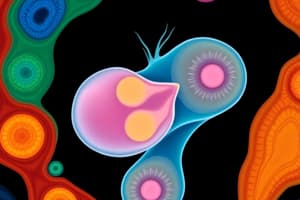Podcast
Questions and Answers
What is a characteristic of sponges in terms of feeding mechanisms?
What is a characteristic of sponges in terms of feeding mechanisms?
- They are detritivores
- They are predaceous feeders
- They are suspension filter feeders (correct)
- They are parasites
Which statement accurately describes the canal system in sponges?
Which statement accurately describes the canal system in sponges?
- The canal system is absent in sponges with radial symmetry
- The canal system allows for both ingestion and excretion in sponges (correct)
- The canal system is found only in freshwater sponges
- The canal system is present in all sponge species
In terms of diversity of sponge body designs, what can be said about sponges with radial symmetry?
In terms of diversity of sponge body designs, what can be said about sponges with radial symmetry?
- They are all sessile organisms
- They lack a skeletal system
- They have a simplified body plan compared to asymmetrical sponges (correct)
- They do not possess amoebocytes
Which type of sponge body design has the fastest water movement due to a reduced spongocoel?
Which type of sponge body design has the fastest water movement due to a reduced spongocoel?
Which class of sponges has spicules composed of silica instead of calcium carbonate?
Which class of sponges has spicules composed of silica instead of calcium carbonate?
Which type of sponge body design is the most complex and largest?
Which type of sponge body design is the most complex and largest?
What is the primary function of amoebocytes in sponges?
What is the primary function of amoebocytes in sponges?
Which type of canal system is present in all members of Class Sclerospongiae?
Which type of canal system is present in all members of Class Sclerospongiae?
How do most sponges achieve sexual reproduction?
How do most sponges achieve sexual reproduction?
Which material is NOT found in the skeletons of sponges in Class Sclerospongiae?
Which material is NOT found in the skeletons of sponges in Class Sclerospongiae?
Flashcards are hidden until you start studying




